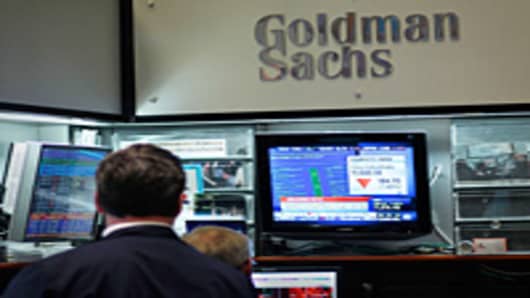Goldman Sachs named 110 new partners, according to an internal memo obtained by Financial News.
Goldman partners, who are officially called Partnership Managing Directors or PMDs, get an increased base salary, the opportunity to invest in Goldman deals, a discount on Goldman stock purchases and a share in the partner compensation pool, among other perks. These latest PMDs join the firm’s existing 375 partners. Goldman names new partners every two years.
Goldman partners typically take around 20 percent of the firm's total compensation pool. That money is divided up between partners according to a secretive "points" system. Basically, each of the partners is assigned a certain number of points by the head of his department. The more points you get, the more you get paid.
Right off the bat, Goldman's senior executives—known as PMDs for partner managing directors—slice off a huge chunk of the revenue. In 2007, the top guys took around 20% of the total. This means that if compensation comes in at $20 billion this year, that’s $4 billion for Goldman’s 400 or so PMDs. If these guys and gals divided the money evenly, each PMD would take home a cool $10 million each.
But even among the senior executives, Goldman is not an egalitarian fraternity. As Duff McDonald reported back in 2005, each PMD has a certain amount of “points” in the partnership pool. In a typical year, something like a quarter to a third of that $4 billion gets handed out according to the points system.
Let’s say this year it’s a quarter, leaving $3 billion. What happens to that $3 billion is a yearly source of contention, controversy, rivalry and envy. Basically, the PMDs get paid according to what the really top guys—guys who run entire departments—think they should get. If there’s some secret formula guiding the discretion, no one has ever discovered it. Certainly, the biggest earners for the firm are favored. But sometimes weird quirks slip in, like some guy in investment banking who hasn’t done a deal in six months getting an outsized bonus. This is always followed by whispered accusations of favoritism.
So here's one stark fact about the world: even if you are a PMD at Goldman, you get paid according to the outcome of a highly politicized debate among the firm's top bosses. You might get a tasty piece of pie, but the size of your cut gets decided behind closed doors.
Although you'll hear that getting named as a partner isn't what it used to be, that's mostly baloney.
"There’s really no equivalent to anything else like a Goldman partnership in the modern business world. It’s almost archaic in the vast elevation of wealth and status it can bring to those who receive it. Some have compared it to the equivalent of getting 'made' by the mafia. But that seriously underestimates what it means to be a Goldman partner. It’s more like being knighted on the battlefield by King Arthur, only this time the battlefield is the global financial market and the Holy Grail is, well, money," I wrote in 2007. And I stand by that.
How do you get named partner at Goldman? Susanne Craig explained it a couple of months ago:
Candidates for partner are vetted by current partners. The review process is known inside Goldman as “cross-ruffing,” a reference to a maneuver in bridge. A few hundred people are typically nominated within the whole company, and the number is eventually whittled down to about 100.
Each department compiles a list of potential candidates, with photos and performance reviews. Partners in another department review it. Candidates are not interviewed, and in many cases are unaware they are even up for partner.
When final decisions are made, it is usually Mr. Blankfein who breaks the good news to the new partners. Few candidates ever find out why they missed the cut.
And Goldman announces only inductees, not those who have been removed. Still, there may be a few telltale signs this year
And, now, here's the list of Goldman's new partners.
Chuck Adams
Nick S Advani
William D Anderson
Scott B Barringer
Gareth W Bater
Tracey E Benford
Avanish R Bhavsar
V Bunty Bohra
Stefan R Bollinger
Robert Boroujerdi
Alison L Bott
Sally A Boyle
Christoph Brand
Torrey J Browder
Philippe L Camu
Donald J Casturo
Chia-Lin Chang
Steven N Cho
David T Y Chou
Thalia Chryssikou
Colin Coleman
Kenneth W Coquillette
Cyril Cottu
Massimo Della Ragione
Michele I Docharty
David P Eisman
Harry Eliades
Christopher Eoyang
Samuel W Finkelstein
Matthew R Gibson
Michele Gill
Michael J Grimaldi
Dylan S Halterlein
Elizabeth M Hammack
Dane E Holmes
Ning Hong
Shin Horle
Stephanie Hui
Eric S Jordan
Vijay M Karnani
Christopher M Keogh
Peter Kimpel
Kelvin Koh
Adam M Korn
David Kostin
Joerg H. Kukies
Andre Laport Ribeiro
Geoffrey Lee
Laurent Lellouche
Eugene H Leouzon
Wayne M Leslie
John R. Levene
Leland Lim
Lindsay P LoBue
David B Ludwig
Raghav Maliah
Matthew F Mallgrave
Alain Marcus
Robert A. Mass
Matthew B. McClure
Patrick S McClymont
Dermot W McDonogh
Richard P McNeil
Avinash Mehrotra
Jonathan M Meltzer
Bruce H Mendelsohn
Peeyush Misra
Bryan P Mix
Atosa Moini
Ricardo Mora
Ezra V. Nahum
Nigel M. O’Sullivan
Nirubhan Pathmanabhan
Jonathan M. Penkin
Michelle H. Pinggera
Dhruv Piplani
Dina H. Powell
Sumit Rajpal
Ganesh Ramani
James H. Reynolds
Stuart Riley
Karl J. Robijns
Craig Russell
Luke A. Sarsfield III
Stephen B. Scobie
John C. Shaffer
Konstantin A. Shakhnovich
Daniel M. Shefter
Michael L. Simpson
Mark R. Sorrell
J. Richard Suth
Jasper Tans
Patrick Tassin de Nonneville
Megan M. Taylor
Teresa Teague
Pawan Tewari
Klaus B. Toft
Kenro Tsutsumi
Richard Tufft
Toshihiko Umetani
Jonathan R. Vanica
Philip J. Venables
Simone Verri
Daniel Wainstein
Kevin A. Walker
Robert P. Wall
David D. Wildermuth
Chang-Po Yang
Alan Zhang
Xing Zhang
____________________________________________________
Questions? Comments? Email us atNetNet@cnbc.com
Follow John on Twitter @ twitter.com/Carney
Follow NetNet on Twitter @ twitter.com/CNBCnetnet
Facebook us @ www.facebook.com/NetNetCNBC



